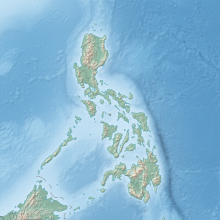Mandalagan
| Mount Mandalagan | |
|---|---|
| Highest point | |
| Elevation | 1,885 m (6,184 ft) |
| Prominence | 1,338 m (4,390 ft) |
| Coordinates | 10°39′N 123°15′E / 10.65°N 123.25°E |
| Geography | |
| Location | Philippines |
| Geology | |
| Age of rock | unknown |
| Mountain type | Stratovolcano |
| Last eruption | Unknown |
 | |
Mount Mandalagan is a complex volcano located at latitude 10.65° North (10°39'0"N), longitude 123.25° East (123°15'0"E), in the province of Negros Occidental, on the north of the island of Negros of the Philippines. It is located inside the Northern Negros Natural Park.
Mandalagan is a solfataric, fumarolic, potentially active stratovolcano. Mandalagan is also known as Nahigda nga Babayi or Lying Women for the Bacolodnons and Negrenses.
Physical Features[edit]

Elevation is 1885 metres (6,184 feet), with a base diameter of 26 kilometres.
Mandalagan is a deeply dissected complex volcano, with a highly altered volcanic dome.
Volcanic activity is reported to include seven volcanic centres, at least five craters and/or calderas up to 2 km in diameter, and a vigorous solfataric area at the highly altered volcanic dome structure.
One solfataric area emits a high-temperature (106 degrees C) plume to 30 m height with a roaring noise like a high-pressure geothermal borehole.
Images[edit]
The Smithsonian listing has a satellite photograph of the general area.
Geological Features[edit]

Mandalagan is part of the Negros Volcanic Belt.
Rock type is principally andesitic with some dacitic
A crater located near the center called "Tinagong Dagat", where hikers camp.
Eruption[edit]
The most recent eruption produced a thin basaltic lava flow, but it is not known when this is likely to have occurred.
Listings[edit]
Philippine Institute of Volcanology and Seismology (PHIVOLCS) lists Mandalagan as potentially active.
The Smithsonian Global Volcanism Program lists Mandalagan as fumarolic.
See also[edit]
- List of active volcanoes in the Philippines
- List of potentially active volcanoes in the Philippines
- List of inactive volcanoes in the Philippines
- Philippine Institute of Volcanology and Seismology
- Volcano

